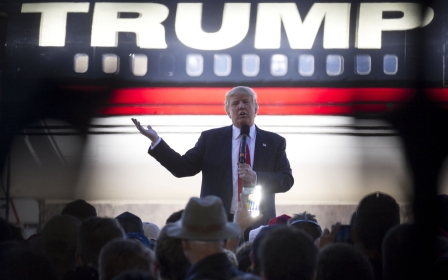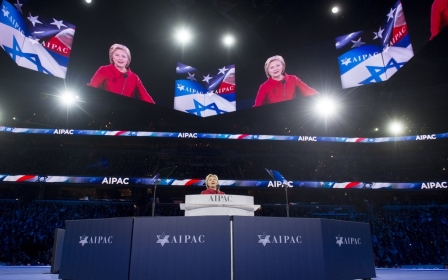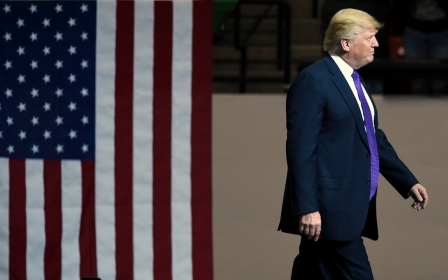What would a Trump presidency look like? A lot like Israel

According to a recent poll, one taken while half a dozen candidates still remained in the Republican Party’s presidential nomination race, Donald Trump emerged as the favourite among Israeli Jews.
On the surface, the poll result appears counter-intuitive, especially given that Trump could never be accused of out-flanking his rivals to the right on Israel. In fact, Trump boasted he’d bring about a “deal” in the Middle East by treating Palestinians as “equals”. Had Trump declared that as an Israeli political candidate, at best there’d be calls for his deportation. At worst, the same political forces that brought an end to the life of Yitzhak Rabin would likely also threaten Trump.
Ultimately, Trump cares less about Israel than any of the 19 candidates who launched 2016 campaigns. So much so that Israel doesn’t even earn a mention on his official campaign website.
So what explains the Israeli infatuation with Trump?
Narcissism goes a long way in explaining what surely ranks as one of the strangest love dynamics in what has already been one of the strangest US elections in living memory.
It’s narcissism because in Trump, Israel sees a reflection of itself, and Israel likes what it sees. After all, the most sincere form of flattery is imitation.
Trump has not only promised to build a wall, but has also promised to ban Muslims from entering the US, suggested special ID badges for Muslim-American citizens, declared his support for torture and for demolishing homes and even executing those related to terrorists, among a swag of other overtly discriminatory proposals.
In case you missed it, Trump is promising to Make America Israel Again.
His vision for America is exactly what’s already in place in the Israeli apartheid state. Palestinians are living the dystopia Trump has envisioned for America’s three million Muslims.
Palestinians can tell you everything you need to know about what it’s like to live behind a wall. More than half a million of them are cut off or negatively affected by what will eventually be a 703-mile wall around the West Bank, while another barrier has effectively locked 1.8 million Palestinian residents of Gaza in what has been described as the world’s largest open-air prison.
Palestinians can tell you exactly what it’s like to be forced, often at gunpoint, to show identification badges at any of the nearly 100 Israeli checkpoints in the West Bank. A 2003 documentary captured how these checkpoints not only restrict freedom of movement, but also how they make day-to-day life virtually impossible. Another documentary showed how the typical 13.7 mile journey from Bethlehem to Ramallah in a car with Israeli license plates takes about 30 minutes, while the same journey in a car with Palestinian plates can take hours.
Palestinians know all about home demolitions, too. Certainly the kind proposed by Trump. Through the first four months of 2016, Israel has demolished nearly 600 Palestinian-owned buildings, which already exceeds the total for the previous year, in spite of the fact the UN deems many or most of these demolitions illegal.
Israel’s Palestinian population also knows a thing or two about discriminatory laws. One database cited more than 50 laws that discriminate against Palestinian citizens of Israel. These laws are designed to make Palestinians second- or even third-class citizens in their own land.
And Palestinians know exactly what Trump is referring to when he vows to ban Muslims from entering the country. The Citizenship and Entry into Israel Law was passed for the very purpose of keeping non-Jews out of Israel. The law prevents Palestinians from the occupied territories who are married to Palestinian citizens of Israel from gaining citizenship or even residency. In 2010, Israel approved a bill that grants Israeli towns the legal standing to reject residents who do not align with the “community’s fundamental outlook”, i.e. the power to ban non-Jewish residents.
Clearly, Trump is imitating Israel, and even more clearly, Israel loves the compliment.
Maybe in Trump, Israelis also see an even more self-indulgent Prime Minister Benjamin Netanyahu, the very embodiment of the kinds of excesses only crony capitalism can afford. Trump not only used corporate-friendly, Congress-backed loopholes to escape nearly $5 billion in bankruptcies, thus passing the buck to taxpayers, but also has benefited from the kind of taxpayer-paid subsidies and incentives that only “inside ball” grants access to.
Netanyahu is also the croniest of all crony capitalists. In his November visit to Washington, DC, Netanyahu pleaded with Obama to sanctify Israel’s illegal annexation of the Golan Heights – seized from Syria during the 1967 war. Netanyahu’s sudden urgency can be explained by the fact that the month prior to his meeting with the US president, a Netanyahu-led effort licensed the rights to drill for what is believed to be "billions of barrels of oil". The company granted the drilling rights contains a shareholder list bearing familiar names including Dick Cheney, Rupert Murdoch and Lord Jacob Rothschild.
That same year, the Israeli newspaper Haaretz accused Netanyahu of being a "captive" to crony capitalism after his government paved the way for monopolistic behavior with Israel’s largest gas company.
What’s also interesting is both Netanyahu and Trump draw their respective political support from similar extremist constituencies. While the former counts on the settler movement to retain power, the latter proactively courts hyper-nationalistic elements in order to attain power.
If there’s any irony to be had here, it can be found in the fact that despite their similarities, Trump and Netanyahu can barely stand each other. When the latter rebuked a planned Trump visit to Israel, the former replied curtly, “Netanyahu can visit me in Washington when I’m the president”.
But after securing victories in each of his last three election campaigns, it’s clear that Israel sees itself in Netanyahu, and a reflection of that self also in Trump, which may explain that country's strange love for the American reality TV star.
- CJ Werleman is the author of Crucifying America (2013), God Hates You. Hate Him Back (2009), and Koran Curious (2011), and he is the host of Foreign Object. Follow him on twitter: @cjwerleman
The views expressed in this article belong to the author and do not necessarily reflect the editorial policy of Middle East Eye.
Photo: US Republican presidential hopeful Donald Trump gives a thumbs-up as he addresses the American Israel Public Affairs Committee (AIPAC) 2016 Policy Conference at the Verizon Center in Washington, DC, on 21 March, 2016 (AFP).
New MEE newsletter: Jerusalem Dispatch
Sign up to get the latest insights and analysis on Israel-Palestine, alongside Turkey Unpacked and other MEE newsletters
Middle East Eye delivers independent and unrivalled coverage and analysis of the Middle East, North Africa and beyond. To learn more about republishing this content and the associated fees, please fill out this form. More about MEE can be found here.





